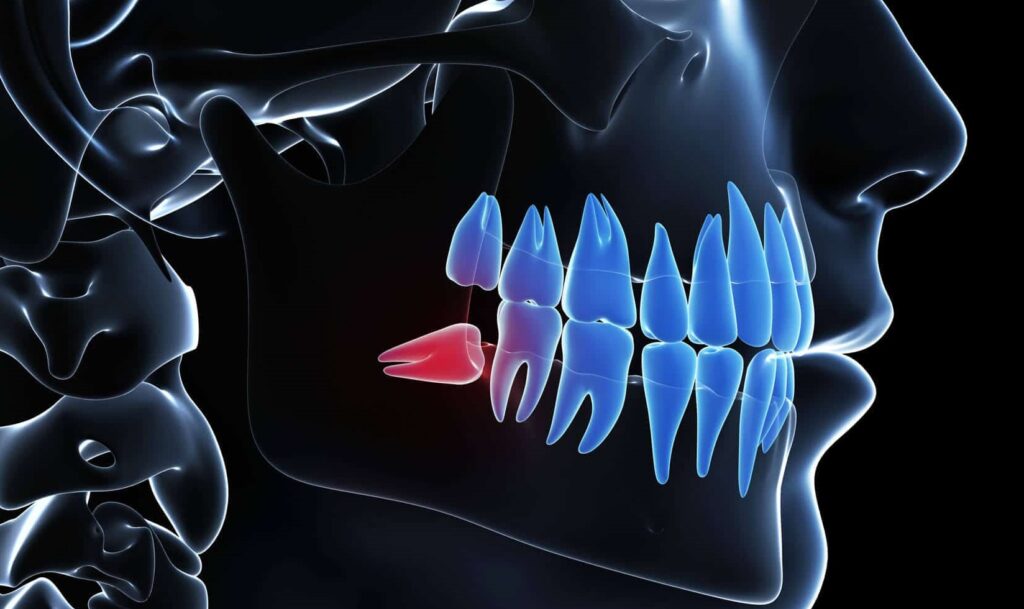
Wisdom teeth are the third and last set of molars to develop, usually throughout adulthood. These teeth are located at the back of your jaw, and most people have four wisdom teeth in total: two on the top jaw and two on the bottom.
In contrast to the other adult teeth, which grow and erupt during your childhood years, they do not begin to form until you are about seven or eight years old. Wisdom teeth normally erupt between the ages of 18 and 30, but no later than 30.
Wisdom tooth problems only occur when there is insufficient space in your jaw or your wisdom tooth becomes trapped in the wrong position while erupting. This is a rather common scenario, which is why they frequently cause pain and discomfort when they erupt.
You may not need to extract your wisdom teeth at all, as pain and discomfort caused by wisdom tooth growth is quite natural in some circumstances. To determine whether or whether you require wisdom teeth removal, contact your dentist and discuss your case.
Why do wisdom teeth cause issues?
Wisdom teeth can be extremely painful, and an estimated 85% of people get them pulled. Human jaws have reduced in size over time. Nowadays, your jaw rarely has enough room for 32 teeth (including your wisdom teeth). Wisdom teeth, that do not have enough room to grow, begin to push against other teeth, causing pain and discomfort.
Impacted wisdom teeth
An impacted wisdom tooth cannot fully emerge to the surface and is only partially emerging or has remained buried in the gums. These teeth will have an impact on the health of your neighboring teeth as well as cause other oral health issues.
A tooth that has been pushed out at an incorrect angle will directly affect the neighboring teeth by forcing them out of place and may cause overcrowding of teeth, which will impair your entire jawline over time. Impacted wisdom teeth might make the tooth next to them, the second molar, more susceptible to infection or decay.
Wisdom teeth may trigger multiple symptoms such as:
- Bleeding gums
- Swollen gums
- Soreness
- Sinus pain
- Trouble when chewing food
How to self-treat wisdom tooth pain
If you are having pain as a result of new wisdom teeth erupting, you should schedule an appointment with your dentist to have the situation evaluated.
Here are some at-home solutions you can try to alleviate your discomfort while you wait for your new wisdom teeth to come in.
1. Over-the-counter pain relief
Because of its anti-inflammatory characteristics, ibuprofen is an excellent treatment for swollen gums and sore jaw.
Aspirin and paracetamol are effective pain relievers. It will take the edge off the pain in your mouth and jaw.
It is critical, however, that you see your doctor to ensure that there are no contraindications to taking this drug and that you take them exactly as recommended.
2. Saltwater rinse
Rinsing your mouth with warm water and salt solution can help improve gum health while also killing any germs that may be present.
3. Apply an icepack
If you have swollen gums and a hurting jaw, you can use an ice pack to numb the area surrounding your cheek. This will aid in the reduction of inflammation. You can also swirl some ice water in your mouth to numb the area and ease the pain.
When you have wisdom tooth pain, avoid applying heat to your face. This is because heat can worsen an infection, resulting in even more swelling and agony.
Wisdom teeth removal procedures
The dentist will perform a comprehensive examination of your teeth during your initial consultation. This will allow them to provide you with more information about whether you need your wisdom teeth out or not. Often, this will necessitate an OPG, which is a complete mouth x-ray, so that the dentist can precisely check your wisdom teeth as well as the surrounding tissues.
Depending on your situation, your dentist may offer you a few solutions. Consult your dentist to learn more about the whole wisdom tooth removal treatment.





